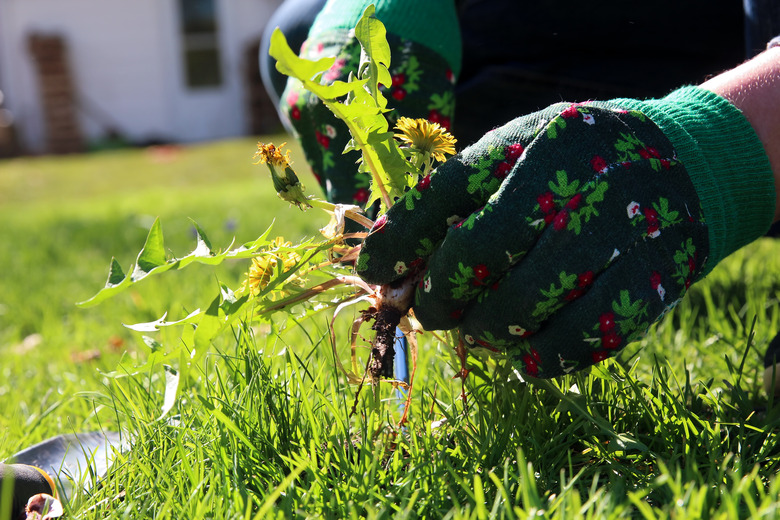Does Vinegar Kill Grass As Well As Weeds?
We may receive a commission on purchases made from links.
Countless articles have been written about different ways to use vinegar. Are you wondering if vinegar kills grass as well as weeds? The short answer is yes. Vinegar isn't the most effective weed killer, but when it is successful, it will kill some grass in addition to the weeds you are targeting.
Tip
Vinegar will kill both weeds and grass, so use it carefully in your yard.
Vinegar Kills Weeds and Grass
Vinegar Kills Weeds and Grass
Vinegar can be an effective weed killer but only in certain circumstances. On the bright side, it generally doesn't harm humans, animals or water supplies. That said, it is a nonselective herbicide, meaning it will also kill the grass and other nearby plants. Using it to kill weeds in driveway cracks or other isolated areas can be effective but be sure to avoid areas with plants or grasses you want to save.
There's a distinction between household vinegar and horticultural vinegar. The former generally contains 5 percent acetic acid, but the latter contains a much higher concentration of acetic acid — from 10 to 20 percent.
You can make a natural weed killer, which is also toxic to your landscape plants, using 1 gallon of white vinegar, 1 cup of salt and 1 tablespoon of liquid dish soap. Pour it into a spray bottle and apply it during the sunniest time of the day. You might need to spray several times since this mixture does not usually get down into the weeds' root system. Some weeds are especially hardy, and this homemade remedy may not work at all. Since it is nonselective, it could end up killing your other plants.
Making homemade weed killers is not recommended by university extension experts. If you want to use a vinegar-based weed killer, these experts advocate instead for purchasing a horticultural-grade vinegar-based product.
More About Vinegar
More About Vinegar
Vinegar is one of the most versatile household items, and it can be found in almost every closet and pantry. It is formed from fermented liquid as naturally occurring bacteria combine with oxygen. It is also referred to as acetic acid and comes in many forms, such as white distilled, red wine, apple cider and balsamic. It's this unique chemical structure that allows it to kill plants.
Although there are a variety of vinegars on the market, white distilled and cleaning vinegar are the ones with the most applications outside of food and cooking. White distilled is the most common in America and is made from grain-based ethanol with 5 percent acidity (that refers to the grain strength). Cleaning vinegar is like white distilled but is more concentrated, with 6 percent acidity.
Other Uses for Vinegar
Other Uses for Vinegar
Vinegar has other outdoor applications as long as you keep its nonselective nature in mind. It can be diluted with 50 percent water and sprayed onto limestone or brick to get rid of calcium buildup. It is also an effective ant deterrent. You can soak garden tools in vinegar overnight to remove rust and sprinkle a bit near sandboxes and garden areas to keep cats away.
One of the best-known uses of vinegar is for removing stains. Add 1 cup to the washing machine during its rinse cycle and it will break down dirt and leave clothes fresh and soft. It is also good for removing water and salt stains from shoes and boots, and it works well on paint stains.
People also use vinegar around the house to clean stovetops (mix the vinegar with baking soda first) and to clean shower curtains, toilet bowls, ovens and dishwashers. It is also widely used to clean coffee pots, humidifiers and windows. It is important to keep in mind that vinegar should never be used to clean computer screens, cell phones, hardwood floors, wood surfaces, granite, marble and unsealed grout.
